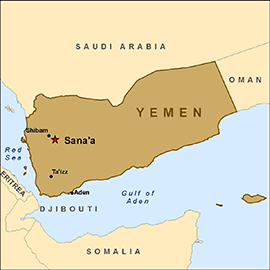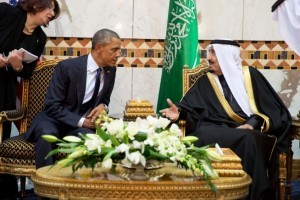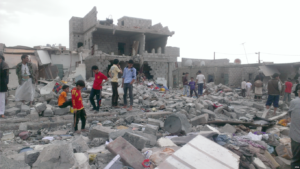As national Democrats claim the mantle as the more hawkish party — and President Trump panders to the Saudi-Israeli tandem — House Republicans moved to curb U.S. support for the Saudi-led war on Yemen, Dennis J Bernstein notes.
By Dennis J Bernstein, July 26, 2017, Consortium News.
Republicans are taking the lead in blocking U.S. participation in the Saudi slaughter in Yemen, which has plunged that country to the brink of starvation and sparked a cholera epidemic. Surprising to many, there was a vote by the Republican-led House of Representatives to block U.S. participation in the Saudi-led war.
The key amendment to the National Defense Authorization Act — prohibiting U.S. military support for the Saudi-led coalition’s bombing of Yemen — was sponsored by Rep. Warren Davidson, R-Ohio. Though the amendment gained bipartisan support — and another restrictive amendment was sponsored by Rep. Dick Nolan, D-Minnesota — the Republican leadership on this issue reflects the changing places in which Democrats have become the more hawkish party in Congress.

I spoke to Kate Gould, Legislative Representative for Middle East Policy for the Friends Committee on National Legislation about this pressing issue of life and death in Yemen. We spoke on July 17.
Dennis Bernstein: Well, this is a terrible situation and getting worse by the day. Could you please remind everyone what it looks like in Yemen on the ground?
Kate Gould: It is a catastrophic situation. According to the United Nations, it is the largest humanitarian crisis in the world right now. And despite the fact that this humanitarian crisis has been a direct result of the Saudi/United Arab Emirate-led war in Yemen, backed by the United States, most Americans have no idea that we are so deeply involved in this war.
A conservative estimate is that seven million people are on the verge of starvation, half a million being children. The people in Yemen are experiencing the world’s largest cholera outbreak. A child under the age of five is dying every ten minutes of preventable causes. Every 35 seconds a child is infected.
This is all preventable with access to clean water and basic sanitation. This war has destroyed the civilian infrastructure in Yemen. We’re talking about air strikes that have targeted warehouses of food, sanitation systems, water infiltration systems. The World Health Organization points out that cholera is not difficult to prevent. The problem is that so many Yemenis lack access to clean water as a result of the infrastructure being in ruins.
DB: What about the medical infrastructure, what about the ability to deal with this kind of epidemic, or is it just going to get worse?
KG: Well, unless we do something to change the situation, it is definitely going to get worse. In Yemen, 90% of food is imported and the Saudis have made this much more difficult. They imposed more restraints on one of the major ports and have refused to allow Yemen to repair the damage caused by air strikes. Often it is difficult for ships to get permission to berth. All these complications have driven up the price of food so that even when food manages to be imported it is too expensive, even for those earning decent incomes. So what we are seeing is a de facto blockade as well as a war.

Saudi King Salman meets with President Barack
Obama at Erga Palace during a state visit to
Saudi Arabia on Jan. 27, 2015. (Official White
House Photo by Pete Souza)
DB: Could you say a few words about the campaign of the Saudi military and what kind of weaponry they are using? Later I would like to discuss US support for all of this.
KG: The Saudi-led war began about two and a half years ago in March, 2015. At that time they asked for US support and got it from the Obama administration. The air campaign has resulted in the carpet bombing of Yemen. It is the Saudis and the United Arab Emirates who have been driving this massive bombardment. There has been an all-out assault on civilians and civilian infrastructure.
And, of course, as Senator Chris Murphy (D-CT) has pointed out, the Saudis would not have been able to carry out this bombing without full US support. Their planes cannot fly without US refueling capacity. In fact, since October the US has actually doubled the amount of fuel it provides to Saudi and Emirati bombers. Last October is significant because at that time there was a major bombing of mourners coming out of a funeral hall which killed about 140 civilians and wounded another six hundred. Since that atrocity, the US has doubled its refueling support.
DB: How does the US justify its support for the Saudis, from a human rights perspective?
KG: We’ve heard very little discussion of the human rights angle from the Trump administration. The Obama administration claimed to be pressuring the Saudis to take precautions to prevent civilian casualties, that this is why the US has provided precision-guided smart bombs, to limit civilian casualties. There has never been an official US response to the fact that the Saudis and Emiratis are deliberately pushing millions to the verge of starvation. They are using hunger as a political tool to get better leverage on the battlefield and at the negotiating table. This is really what is driving the humanitarian nightmare.

President Donald Trump and First Lady
Melania Trump are welcomed with bouquets
of flowers, May 20, 2017, on their arrival to
King Khalid International Airport in Riyadh,
Saudi Arabia. (Official White House Photo
by Andrea Hanks)
DB: We know that Trump was just in Saudi Arabia and signed a massive weapons contract. Will this weaponry contribute to the coming famine and cholera epidemic?
KG: Certainly. It is providing the Saudis a blank check for this devastating war in which direct casualties from airstrikes are conservatively estimated at around 10,000 and millions of people have been displaced. It sends the message that the United States is willing to support the Saudis despite massive human rights violations.
DB: There is no way the US or the Saudis can deny the tragedy. This has been thoroughly documented by US and international rights groups.
KG: But what they will often say is that a lot of the fault lies with the Houthi rebel groups. And it is certainly true that the Houthi rebels have committed massive human rights violations. But as far as the mass devastation of public infrastructure is concerned, which is leading to the humanitarian crisis, the majority of the blame can be assigned to the Saudi-led war and the US backing.
Repeatedly, Amnesty International and Human Rights Watch, responding to the scene of unlawful airstrikes against civilian targets, have found either unexploded US-made bombs or identifiable fragments of US bombs. This was the case with the bombing of the funeral procession last October. Still, the US government claims that it is trying to limit civilian casualties.
DB: It is interesting that the Republican-led House has voted to block US participation in the war in Yemen. It seems somewhat counter-intuitive.
KG: It is definitely surprising. Although I’ve been working around the clock on this recently, even I was surprised. What happened is that last week [week of July 9] the House of Representatives voted on the major military policy bill for fiscal year 2018. This is a major piece of national security legislation which authorizes funding for the Pentagon. It has to get passed every year and it provides an opportunity for members to vote on amendments that have to do with national security.
Two of these amendments were particularly consequential for Yemen. One was introduced by a Republican, Warren Davidson of Ohio, and the other by Rick Nolan, a Democrat from Minnesota. They added language that would require the Trump administration to stop providing refueling for Saudi and Emirati bombers, as well as to stop intelligence sharing and other forms of military support. It wouldn’t stop the weapons sales, which is another process, but it would stop military support for this indiscriminate war.
The Davidson amendment would prohibit US military action in Yemen that is not authorized by the 2001 Authorization for Use of Military Force. Given that US participation in the Saudi-led war in Yemen is not targeting Al-Qaeda, it is not authorized by the 2001 AUMF and is prohibited by this amendment. The Nolan amendment prohibits the deployment of US troops for any participation in Yemen’s civil war.
This means that the House just voted to end US funding of our military for the Saudi-led war in Yemen. This is really unprecedented and it builds on the wave of congressional momentum that we saw last month when 47 senators voted against sending more of what we call “weapons of mass starvation” to Yemen. So we have clear signals from both the House and the Senate that there is no support for Trump’s blank check to Saudi Arabia for this devastating war.
DB: So now this goes to the Senate?
KG: Yes, and there we are going to face a more difficult fight. We’re preparing for that now. We definitely will see some important Yemen votes in the Senate. It could come up right after a health care vote in early August or it might not be voted on until the fall. But we will see votes on Yemen. It is unclear whether a Senate member will offer amendments similar to the Davidson or Nolan amendments.
After the Senate votes on the various amendments, they will both have versions of this and they will have to come back and conference a final version to send to the president. This is definitely a time to push our senators to follow suit with the House and oppose US involvement in this devastating war in Yemen.
DB: Finally, who are some of these Republican Congressional members who stood up in this effort to restrain this oncoming famine? Who were some of the surprise votes?
KG: Actually, this was added in a whole block of legislation so we can’t point to exactly who supported and who opposed it. It was good to see Warren Davidson taking a leadership role on this issue. He is relatively new in the Senate, having taken [Former House Speaker John] Boehner’s seat. It is noteworthy also that the Chairman of the House Armed Services Committee, Mac Thornberry from Texas, allowed this amendment to go forward. Just that the House Republican leadership allowed this to move forward is really interesting in itself.
DB: Yes, it is. It seems to me that the Democrats have really become out-of-control Cold Warriors, either lost in Russia-gate or dropping the ball on this very important foreign policy issue. We thank you, Kate Gould, Legislative Representative for Middle East Policy with the Friends Committee on National Legislation.
KG: And I just want to say that we can win on this one and we need everybody to get involved. You can go to our website, fcnl.org, to get more information. Again, 47 Senators voted last month to block these bomb sales and we only need 51 votes. And with Trump’s massive arms deal with Saudi Arabia, I’m sure we will have more votes on this. But it is really important to stay engaged and we need everybody to get involved and contact your members of Congress.
Dennis J Bernstein is a host of “Flashpoints” on the Pacifica radio network and the author of Special Ed: Voices from a Hidden Classroom. You can access the audio archives at www.flashpoints.net.









